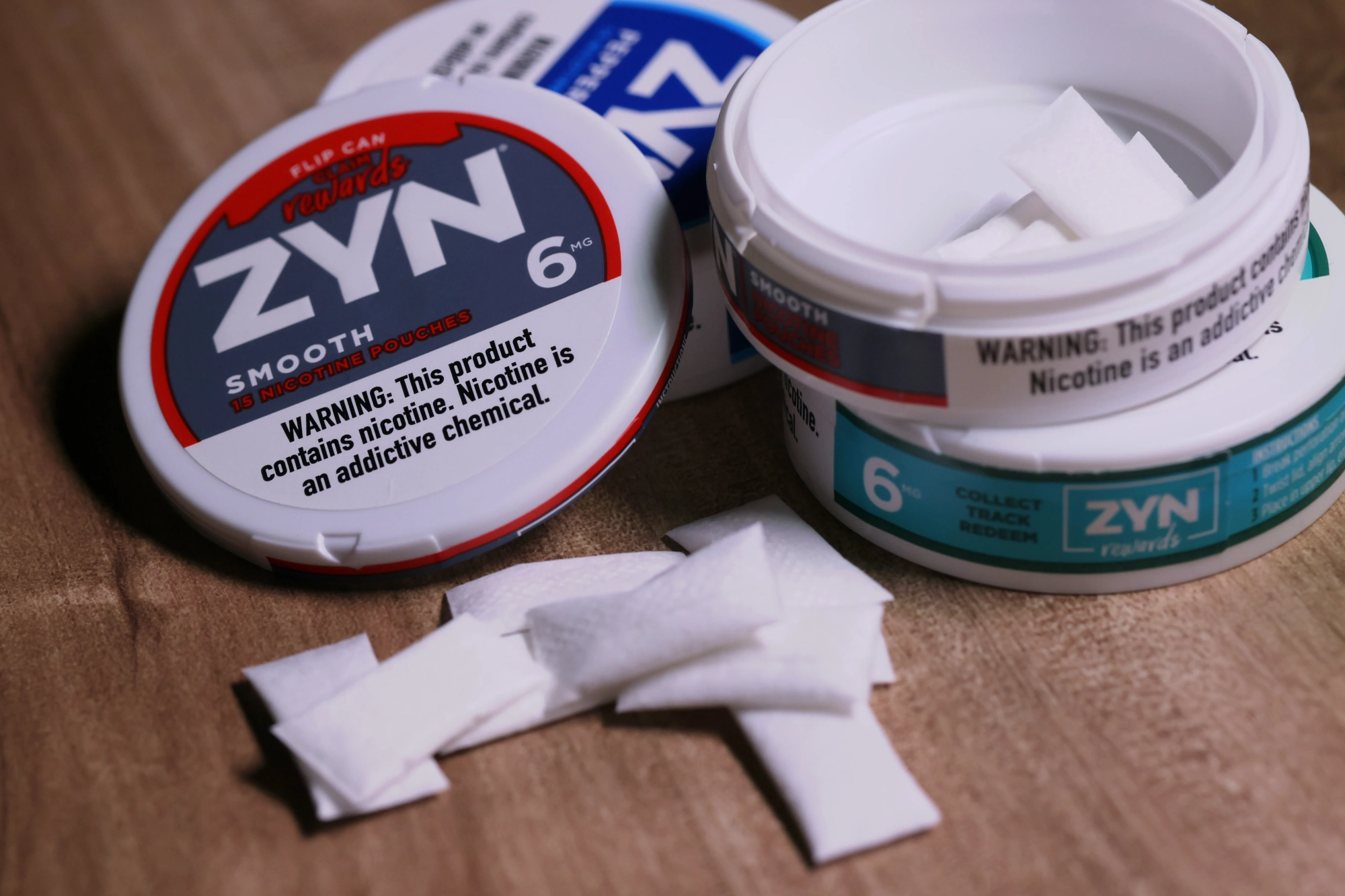Data: Philip Morris International; Chart: Axios Visuals
It's not food, it's not chewing tobacco and it's not gum — though it might look like it when you see it — but it is becoming America's new addictive obsession.
Why it matters: Sales of Zyn nicotine pouches are soaring, prompting the tobacco company that makes them to scramble to boost U.S. production to meet demand.
The big picture: People are popping nicotine pouches into their mouths at games, at the movies, at the workplace, at home, at the store — it's America's new addictive habit.
- Celebrity Josh Brolin even admitted to using it while sleeping (which is not recommended).
How it works: Zyn pouches are placed between the gum and lip, gradually releasing nicotine over time.
- The pouches are discreet and don't produce smoke or odors like cigarettes.
 Sales of Zyn nicotine pouches are soaring. Photo Illustration by Michael M. Santiago/Getty Images
Sales of Zyn nicotine pouches are soaring. Photo Illustration by Michael M. Santiago/Getty Images Threat level: The product is addictive because nicotine is addictive.
- But it does not cause cancer since it doesn't contain tobacco, whose harmful chemicals are carcinogenic. As a result, advocates say nicotine pouches can serve as a safer alternative to smoking.
- Philip Morris International U.S. CEO Stacey Kennedy argued that nicotine is "misunderstood" and contains "cognitive benefits."
- "You have to be able to separate out the misconceptions of what causes harm — and nicotine is probably one of the most misunderstood compounds, because many people believe that nicotine is responsible for smoking-related disease, and it's not," Kennedy said in an interview.
Yes, but: Tobacco industry watchdogs say products that contain nicotine, such as pouches and e-cigarettes, can serve as a gateway to smoking, especially for teens.
- "Tobacco companies have a long history of lying to Congress and the public about the addictiveness of nicotine, so they're not a credible source of information about nicotine," Yolonda C. Richardson, CEO of the Campaign for Tobacco-Free Kids, told Axios in an email.
- "While those who smoke heavily and have been unable to quit may potentially benefit from switching completely to nicotine pouches, there is a concern that they may appeal to adolescents and other new users of nicotine, particularly through the way they are featured in advertisements," according to a synopsis of a Johns Hopkins Bloomberg School of Public Health study.
By the numbers: U.S. shipments of Zyn pouches rose 177% from the first quarter of 2023 to the first quarter of 2025.
- The company got 42% of its revenue from smoke-free products in Q1 2025 as it pursues its goal of one day ending cigarette sales — a stated objective that critics say is hollow given that smokers continue to deliver substantial revenue.
- PMI — which sells cigarettes outside of the U.S. but does not sell them here — still gets a majority of its revenue from smokers, but that's likely to flip soon as Zyn sales continue to grow. (PMI split off from Philip Morris USA owner Altria Group in 2008. Their deal called for Altria to sell Marlboro cigarettes in the U.S., while Philip Morris International would sell them in other markets.)
State of play: Sales could accelerate further after the FDA, in the final days of the Biden administration, authorized the marketing of 20 Zyn products following an extensive scientific review.
- Matthew Farrelly, director of the Office of Science in the FDA's Center for Tobacco Products, noted in the FDA's announcement about Zyn's marketing approval that "the data show that these nicotine pouch products" are "benefiting adults who use cigarettes and/or smokeless tobacco products and completely switch to these products."
- Now the company is adding a $600 million plant in Aurora, Colorado, to boost production.
The big question: Will the Trump administration be friendly to nicotine pouches?
- So far the new leadership at the Department of Health and Human Services and the FDA have said little about their approach to tobacco and nicotine product regulation.
- An HHS spokesperson recently told Axios that the FDA's "position is centered on reducing the harm caused by nicotine addiction — particularly through combustible tobacco products like cigarettes — while exploring strategies to make less harmful alternatives available to adults who are trying to quit smoking."
- "Nicotine itself, while addictive, is not the primary cause of smoking-related disease and death. Those are caused by the thousands of harmful chemicals in combustible tobacco," the spokesperson said.
- The FDA is "working to reduce nicotine levels in cigarettes to minimally addictive or non-addictive levels, aiming to prevent youth initiation and help current smokers quit."
The bottom line: Once you become aware of nicotine pouches, you'll start to spot people using them.
Go deeper.




